Carlill v Carbolic Smoke Ball Co & Minor's Capacity to Contract
VerifiedAdded on 2023/06/05
|6
|1351
|212
AI Summary
This article discusses the landmark case of Carlill v Carbolic Smoke Ball Co and the capacity of minors to contract. It covers the issues, relevant laws, and application of the case. It also discusses the enforceability of contracts made with minors.
Contribute Materials
Your contribution can guide someone’s learning journey. Share your
documents today.
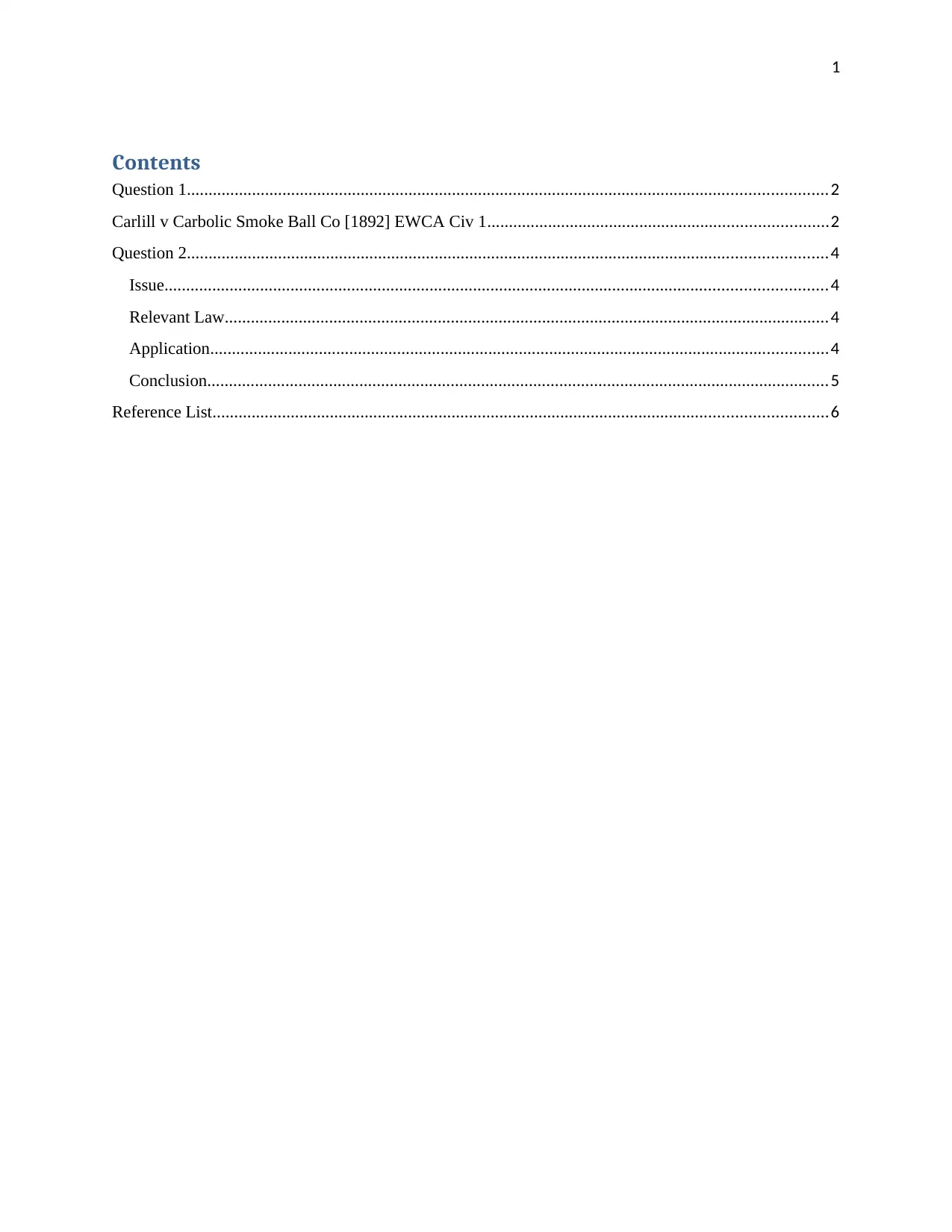
1
Contents
Question 1...................................................................................................................................................2
Carlill v Carbolic Smoke Ball Co [1892] EWCA Civ 1..............................................................................2
Question 2...................................................................................................................................................4
Issue........................................................................................................................................................4
Relevant Law...........................................................................................................................................4
Application..............................................................................................................................................4
Conclusion...............................................................................................................................................5
Reference List.............................................................................................................................................6
Contents
Question 1...................................................................................................................................................2
Carlill v Carbolic Smoke Ball Co [1892] EWCA Civ 1..............................................................................2
Question 2...................................................................................................................................................4
Issue........................................................................................................................................................4
Relevant Law...........................................................................................................................................4
Application..............................................................................................................................................4
Conclusion...............................................................................................................................................5
Reference List.............................................................................................................................................6
Secure Best Marks with AI Grader
Need help grading? Try our AI Grader for instant feedback on your assignments.
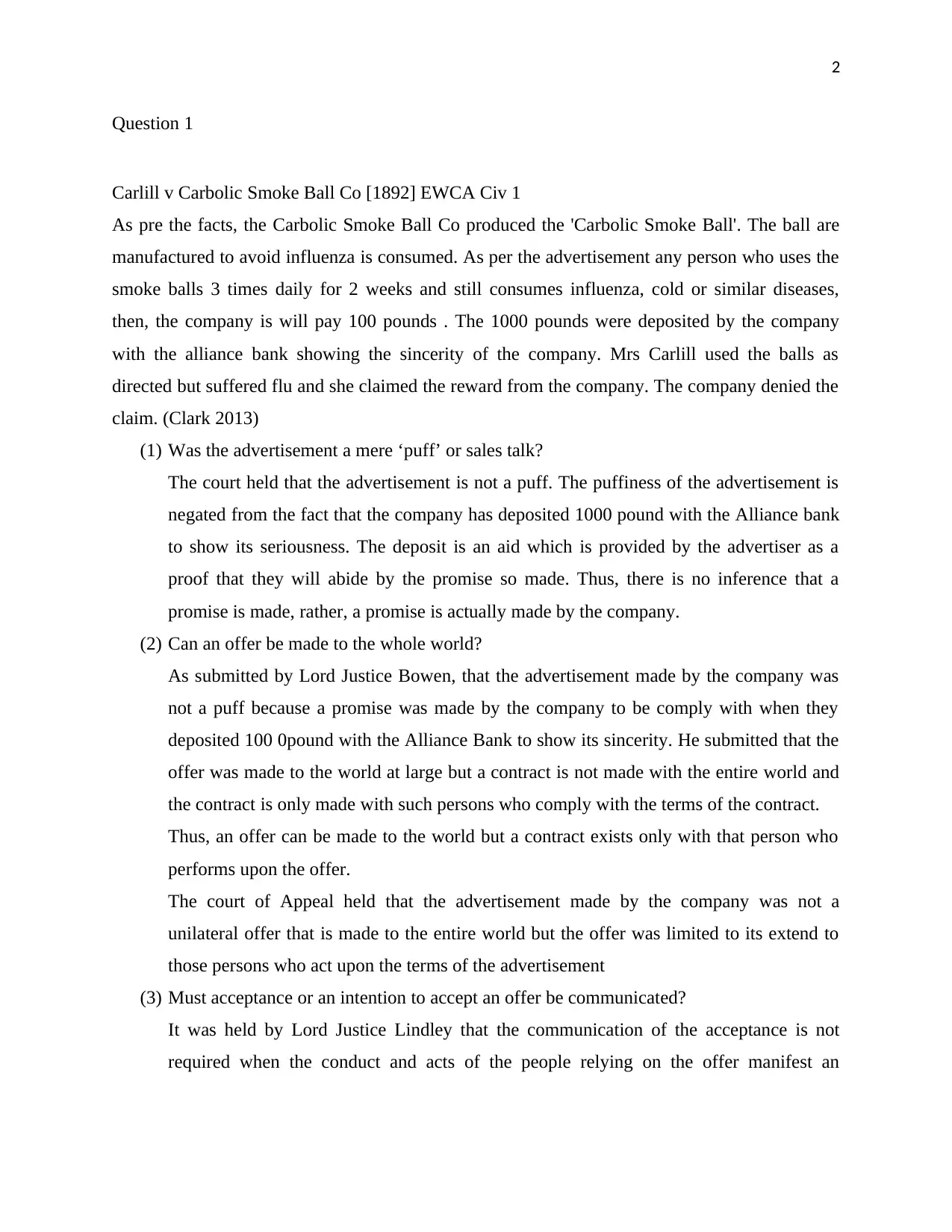
2
Question 1
Carlill v Carbolic Smoke Ball Co [1892] EWCA Civ 1
As pre the facts, the Carbolic Smoke Ball Co produced the 'Carbolic Smoke Ball'. The ball are
manufactured to avoid influenza is consumed. As per the advertisement any person who uses the
smoke balls 3 times daily for 2 weeks and still consumes influenza, cold or similar diseases,
then, the company is will pay 100 pounds . The 1000 pounds were deposited by the company
with the alliance bank showing the sincerity of the company. Mrs Carlill used the balls as
directed but suffered flu and she claimed the reward from the company. The company denied the
claim. (Clark 2013)
(1) Was the advertisement a mere ‘puff’ or sales talk?
The court held that the advertisement is not a puff. The puffiness of the advertisement is
negated from the fact that the company has deposited 1000 pound with the Alliance bank
to show its seriousness. The deposit is an aid which is provided by the advertiser as a
proof that they will abide by the promise so made. Thus, there is no inference that a
promise is made, rather, a promise is actually made by the company.
(2) Can an offer be made to the whole world?
As submitted by Lord Justice Bowen, that the advertisement made by the company was
not a puff because a promise was made by the company to be comply with when they
deposited 100 0pound with the Alliance Bank to show its sincerity. He submitted that the
offer was made to the world at large but a contract is not made with the entire world and
the contract is only made with such persons who comply with the terms of the contract.
Thus, an offer can be made to the world but a contract exists only with that person who
performs upon the offer.
The court of Appeal held that the advertisement made by the company was not a
unilateral offer that is made to the entire world but the offer was limited to its extend to
those persons who act upon the terms of the advertisement
(3) Must acceptance or an intention to accept an offer be communicated?
It was held by Lord Justice Lindley that the communication of the acceptance is not
required when the conduct and acts of the people relying on the offer manifest an
Question 1
Carlill v Carbolic Smoke Ball Co [1892] EWCA Civ 1
As pre the facts, the Carbolic Smoke Ball Co produced the 'Carbolic Smoke Ball'. The ball are
manufactured to avoid influenza is consumed. As per the advertisement any person who uses the
smoke balls 3 times daily for 2 weeks and still consumes influenza, cold or similar diseases,
then, the company is will pay 100 pounds . The 1000 pounds were deposited by the company
with the alliance bank showing the sincerity of the company. Mrs Carlill used the balls as
directed but suffered flu and she claimed the reward from the company. The company denied the
claim. (Clark 2013)
(1) Was the advertisement a mere ‘puff’ or sales talk?
The court held that the advertisement is not a puff. The puffiness of the advertisement is
negated from the fact that the company has deposited 1000 pound with the Alliance bank
to show its seriousness. The deposit is an aid which is provided by the advertiser as a
proof that they will abide by the promise so made. Thus, there is no inference that a
promise is made, rather, a promise is actually made by the company.
(2) Can an offer be made to the whole world?
As submitted by Lord Justice Bowen, that the advertisement made by the company was
not a puff because a promise was made by the company to be comply with when they
deposited 100 0pound with the Alliance Bank to show its sincerity. He submitted that the
offer was made to the world at large but a contract is not made with the entire world and
the contract is only made with such persons who comply with the terms of the contract.
Thus, an offer can be made to the world but a contract exists only with that person who
performs upon the offer.
The court of Appeal held that the advertisement made by the company was not a
unilateral offer that is made to the entire world but the offer was limited to its extend to
those persons who act upon the terms of the advertisement
(3) Must acceptance or an intention to accept an offer be communicated?
It was held by Lord Justice Lindley that the communication of the acceptance is not
required when the conduct and acts of the people relying on the offer manifest an
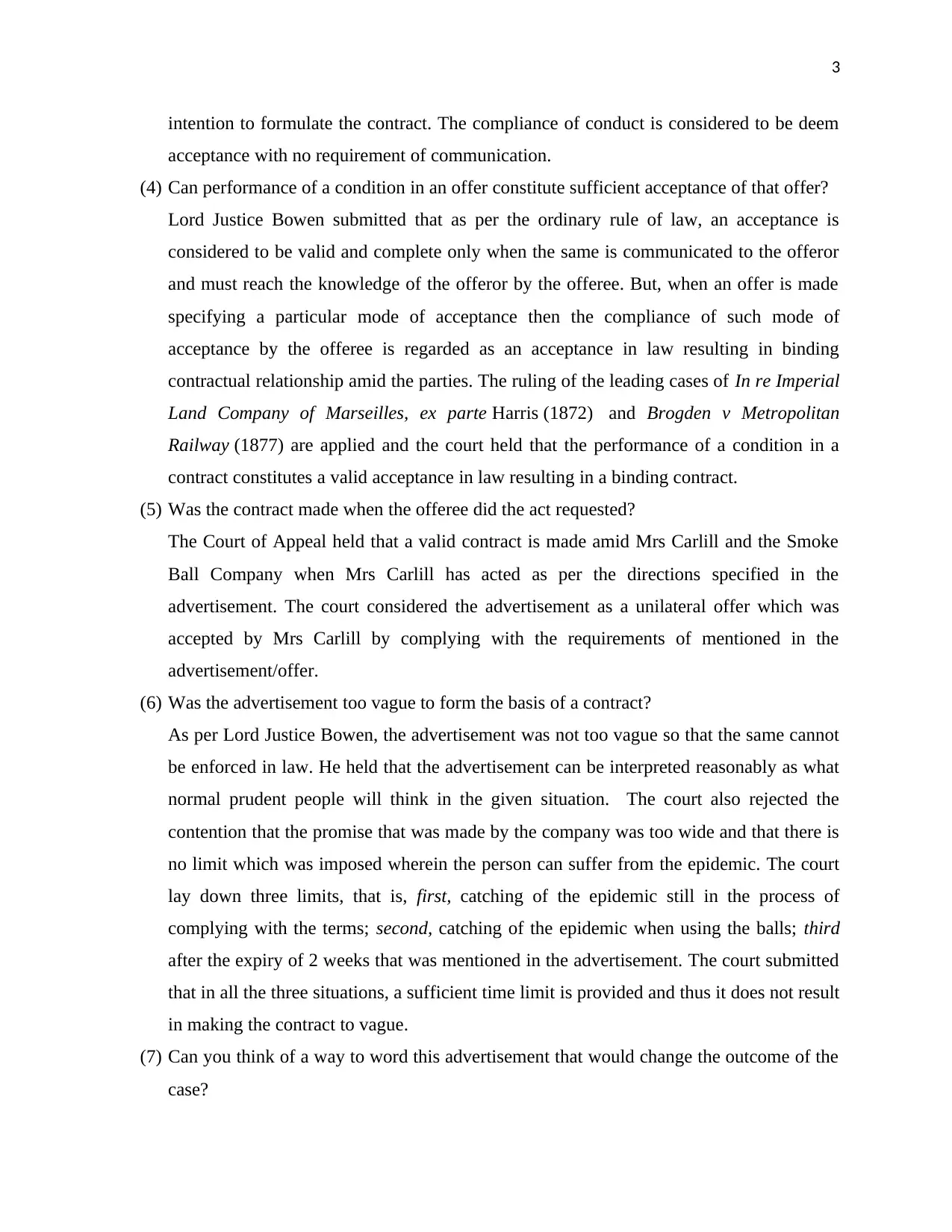
3
intention to formulate the contract. The compliance of conduct is considered to be deem
acceptance with no requirement of communication.
(4) Can performance of a condition in an offer constitute sufficient acceptance of that offer?
Lord Justice Bowen submitted that as per the ordinary rule of law, an acceptance is
considered to be valid and complete only when the same is communicated to the offeror
and must reach the knowledge of the offeror by the offeree. But, when an offer is made
specifying a particular mode of acceptance then the compliance of such mode of
acceptance by the offeree is regarded as an acceptance in law resulting in binding
contractual relationship amid the parties. The ruling of the leading cases of In re Imperial
Land Company of Marseilles, ex parte Harris (1872) and Brogden v Metropolitan
Railway (1877) are applied and the court held that the performance of a condition in a
contract constitutes a valid acceptance in law resulting in a binding contract.
(5) Was the contract made when the offeree did the act requested?
The Court of Appeal held that a valid contract is made amid Mrs Carlill and the Smoke
Ball Company when Mrs Carlill has acted as per the directions specified in the
advertisement. The court considered the advertisement as a unilateral offer which was
accepted by Mrs Carlill by complying with the requirements of mentioned in the
advertisement/offer.
(6) Was the advertisement too vague to form the basis of a contract?
As per Lord Justice Bowen, the advertisement was not too vague so that the same cannot
be enforced in law. He held that the advertisement can be interpreted reasonably as what
normal prudent people will think in the given situation. The court also rejected the
contention that the promise that was made by the company was too wide and that there is
no limit which was imposed wherein the person can suffer from the epidemic. The court
lay down three limits, that is, first, catching of the epidemic still in the process of
complying with the terms; second, catching of the epidemic when using the balls; third
after the expiry of 2 weeks that was mentioned in the advertisement. The court submitted
that in all the three situations, a sufficient time limit is provided and thus it does not result
in making the contract to vague.
(7) Can you think of a way to word this advertisement that would change the outcome of the
case?
intention to formulate the contract. The compliance of conduct is considered to be deem
acceptance with no requirement of communication.
(4) Can performance of a condition in an offer constitute sufficient acceptance of that offer?
Lord Justice Bowen submitted that as per the ordinary rule of law, an acceptance is
considered to be valid and complete only when the same is communicated to the offeror
and must reach the knowledge of the offeror by the offeree. But, when an offer is made
specifying a particular mode of acceptance then the compliance of such mode of
acceptance by the offeree is regarded as an acceptance in law resulting in binding
contractual relationship amid the parties. The ruling of the leading cases of In re Imperial
Land Company of Marseilles, ex parte Harris (1872) and Brogden v Metropolitan
Railway (1877) are applied and the court held that the performance of a condition in a
contract constitutes a valid acceptance in law resulting in a binding contract.
(5) Was the contract made when the offeree did the act requested?
The Court of Appeal held that a valid contract is made amid Mrs Carlill and the Smoke
Ball Company when Mrs Carlill has acted as per the directions specified in the
advertisement. The court considered the advertisement as a unilateral offer which was
accepted by Mrs Carlill by complying with the requirements of mentioned in the
advertisement/offer.
(6) Was the advertisement too vague to form the basis of a contract?
As per Lord Justice Bowen, the advertisement was not too vague so that the same cannot
be enforced in law. He held that the advertisement can be interpreted reasonably as what
normal prudent people will think in the given situation. The court also rejected the
contention that the promise that was made by the company was too wide and that there is
no limit which was imposed wherein the person can suffer from the epidemic. The court
lay down three limits, that is, first, catching of the epidemic still in the process of
complying with the terms; second, catching of the epidemic when using the balls; third
after the expiry of 2 weeks that was mentioned in the advertisement. The court submitted
that in all the three situations, a sufficient time limit is provided and thus it does not result
in making the contract to vague.
(7) Can you think of a way to word this advertisement that would change the outcome of the
case?
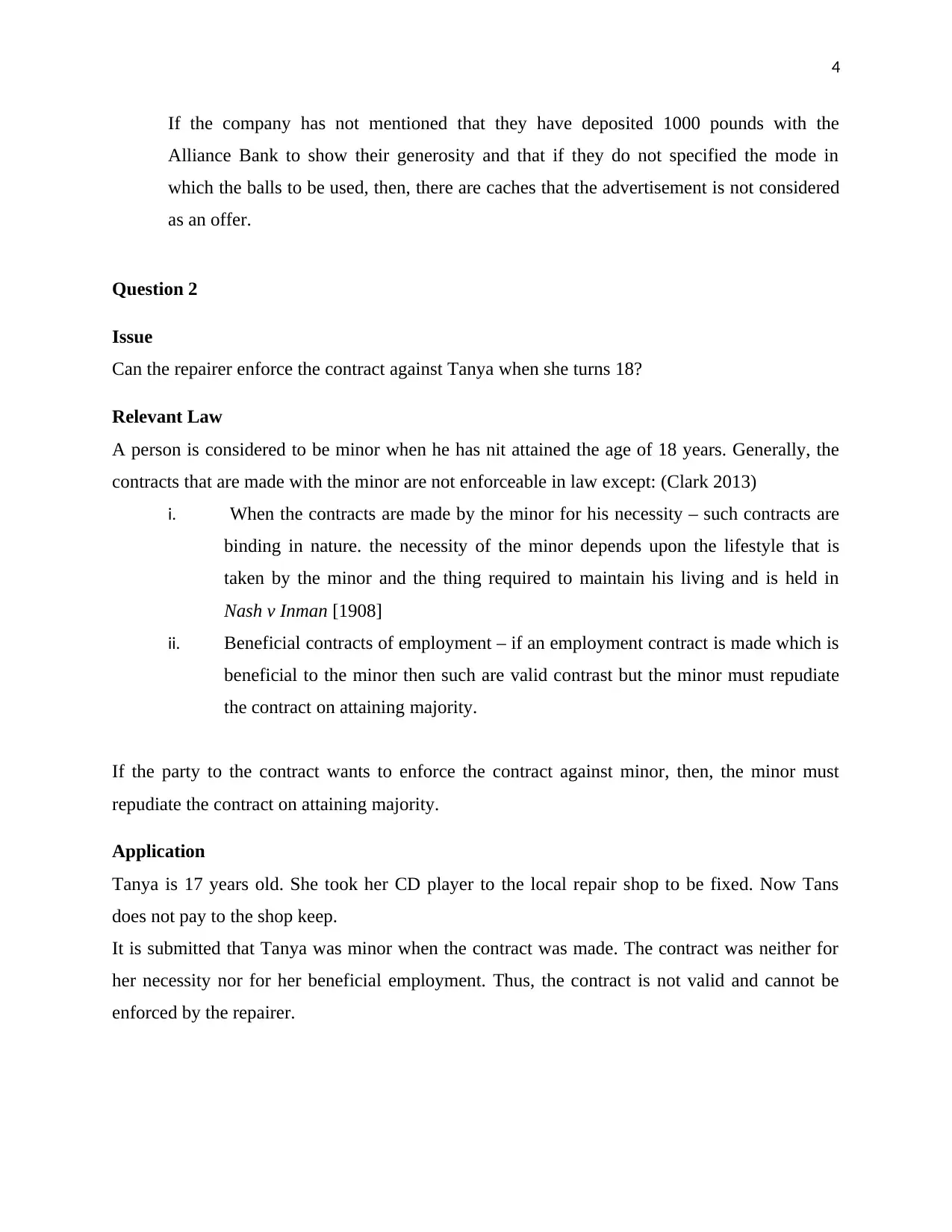
4
If the company has not mentioned that they have deposited 1000 pounds with the
Alliance Bank to show their generosity and that if they do not specified the mode in
which the balls to be used, then, there are caches that the advertisement is not considered
as an offer.
Question 2
Issue
Can the repairer enforce the contract against Tanya when she turns 18?
Relevant Law
A person is considered to be minor when he has nit attained the age of 18 years. Generally, the
contracts that are made with the minor are not enforceable in law except: (Clark 2013)
i. When the contracts are made by the minor for his necessity – such contracts are
binding in nature. the necessity of the minor depends upon the lifestyle that is
taken by the minor and the thing required to maintain his living and is held in
Nash v Inman [1908]
ii. Beneficial contracts of employment – if an employment contract is made which is
beneficial to the minor then such are valid contrast but the minor must repudiate
the contract on attaining majority.
If the party to the contract wants to enforce the contract against minor, then, the minor must
repudiate the contract on attaining majority.
Application
Tanya is 17 years old. She took her CD player to the local repair shop to be fixed. Now Tans
does not pay to the shop keep.
It is submitted that Tanya was minor when the contract was made. The contract was neither for
her necessity nor for her beneficial employment. Thus, the contract is not valid and cannot be
enforced by the repairer.
If the company has not mentioned that they have deposited 1000 pounds with the
Alliance Bank to show their generosity and that if they do not specified the mode in
which the balls to be used, then, there are caches that the advertisement is not considered
as an offer.
Question 2
Issue
Can the repairer enforce the contract against Tanya when she turns 18?
Relevant Law
A person is considered to be minor when he has nit attained the age of 18 years. Generally, the
contracts that are made with the minor are not enforceable in law except: (Clark 2013)
i. When the contracts are made by the minor for his necessity – such contracts are
binding in nature. the necessity of the minor depends upon the lifestyle that is
taken by the minor and the thing required to maintain his living and is held in
Nash v Inman [1908]
ii. Beneficial contracts of employment – if an employment contract is made which is
beneficial to the minor then such are valid contrast but the minor must repudiate
the contract on attaining majority.
If the party to the contract wants to enforce the contract against minor, then, the minor must
repudiate the contract on attaining majority.
Application
Tanya is 17 years old. She took her CD player to the local repair shop to be fixed. Now Tans
does not pay to the shop keep.
It is submitted that Tanya was minor when the contract was made. The contract was neither for
her necessity nor for her beneficial employment. Thus, the contract is not valid and cannot be
enforced by the repairer.
Secure Best Marks with AI Grader
Need help grading? Try our AI Grader for instant feedback on your assignments.
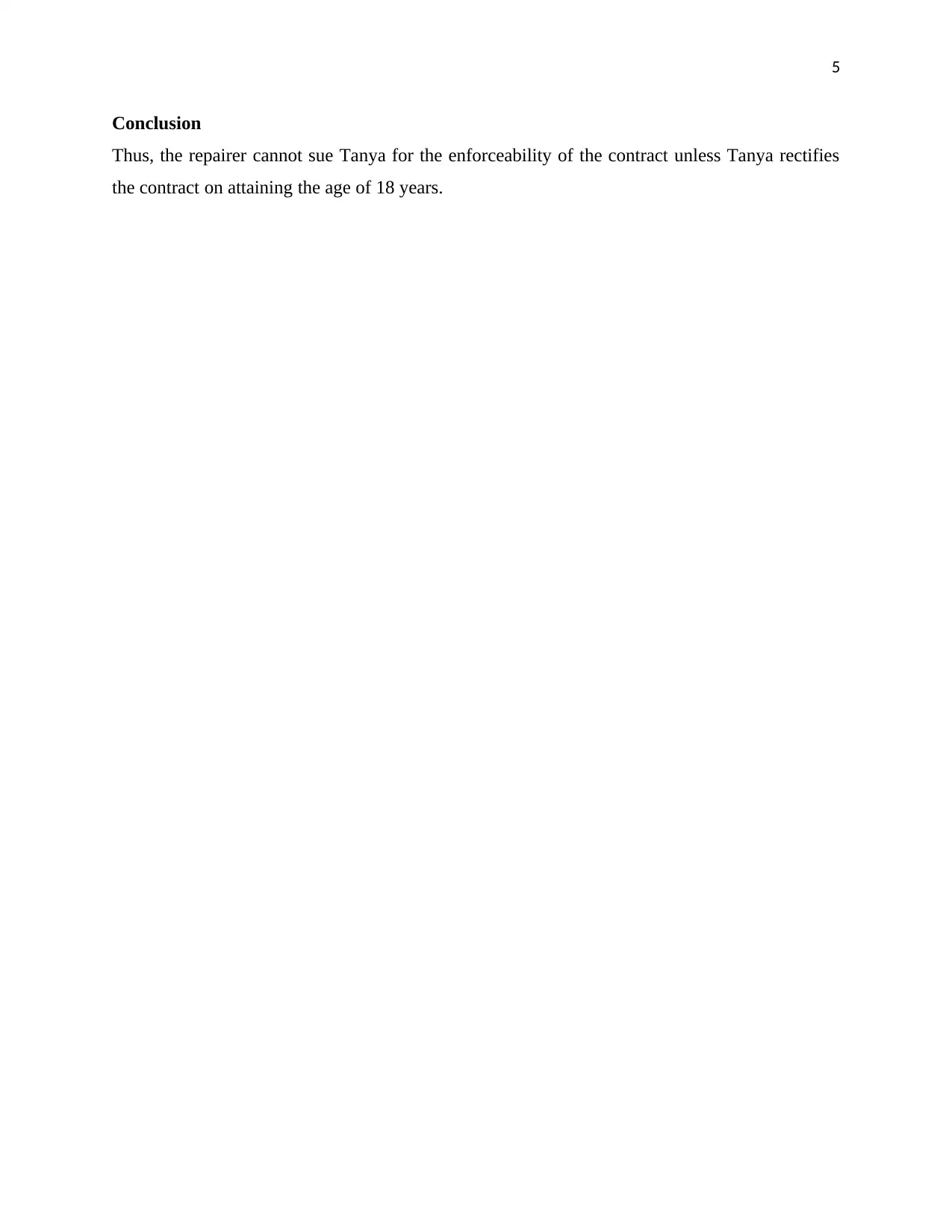
5
Conclusion
Thus, the repairer cannot sue Tanya for the enforceability of the contract unless Tanya rectifies
the contract on attaining the age of 18 years.
Conclusion
Thus, the repairer cannot sue Tanya for the enforceability of the contract unless Tanya rectifies
the contract on attaining the age of 18 years.
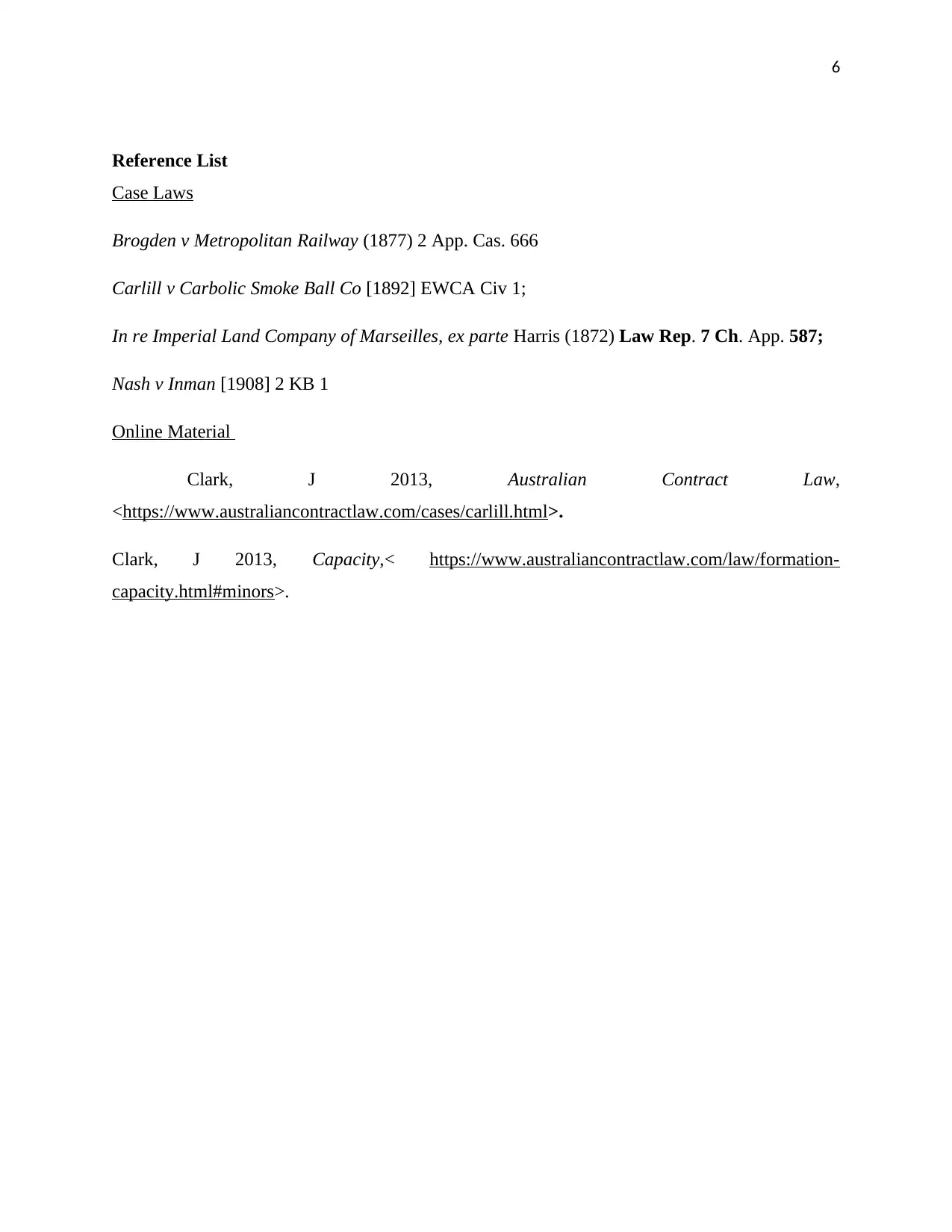
6
Reference List
Case Laws
Brogden v Metropolitan Railway (1877) 2 App. Cas. 666
Carlill v Carbolic Smoke Ball Co [1892] EWCA Civ 1;
In re Imperial Land Company of Marseilles, ex parte Harris (1872) Law Rep. 7 Ch. App. 587;
Nash v Inman [1908] 2 KB 1
Online Material
Clark, J 2013, Australian Contract Law,
<https://www.australiancontractlaw.com/cases/carlill.html>.
Clark, J 2013, Capacity,< https://www.australiancontractlaw.com/law/formation-
capacity.html#minors>.
Reference List
Case Laws
Brogden v Metropolitan Railway (1877) 2 App. Cas. 666
Carlill v Carbolic Smoke Ball Co [1892] EWCA Civ 1;
In re Imperial Land Company of Marseilles, ex parte Harris (1872) Law Rep. 7 Ch. App. 587;
Nash v Inman [1908] 2 KB 1
Online Material
Clark, J 2013, Australian Contract Law,
<https://www.australiancontractlaw.com/cases/carlill.html>.
Clark, J 2013, Capacity,< https://www.australiancontractlaw.com/law/formation-
capacity.html#minors>.
1 out of 6
Related Documents
Your All-in-One AI-Powered Toolkit for Academic Success.
+13062052269
info@desklib.com
Available 24*7 on WhatsApp / Email
![[object Object]](/_next/static/media/star-bottom.7253800d.svg)
Unlock your academic potential
© 2024 | Zucol Services PVT LTD | All rights reserved.




